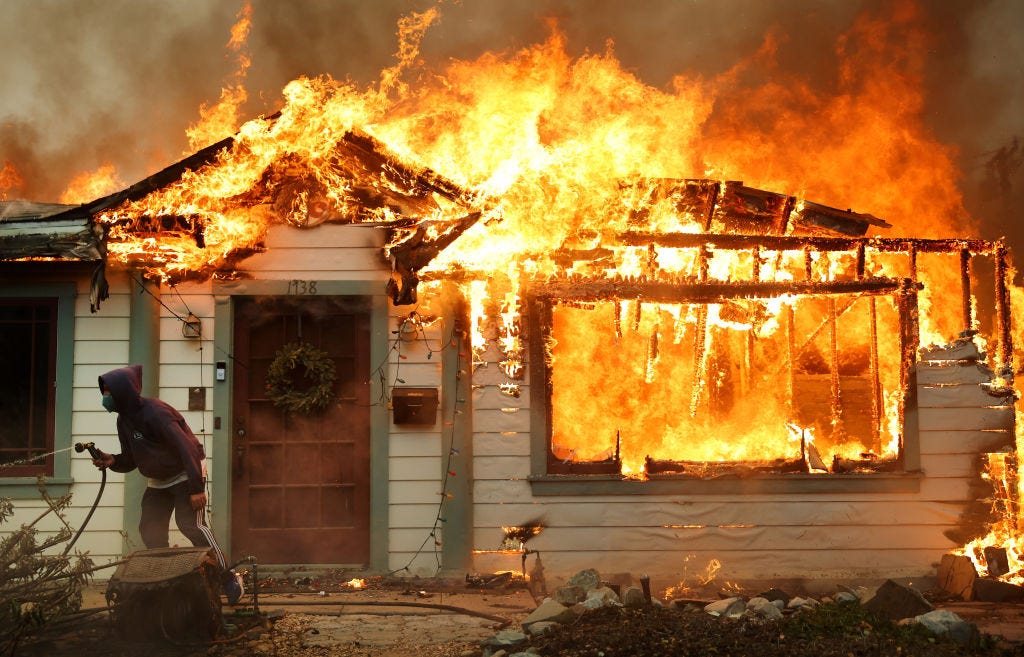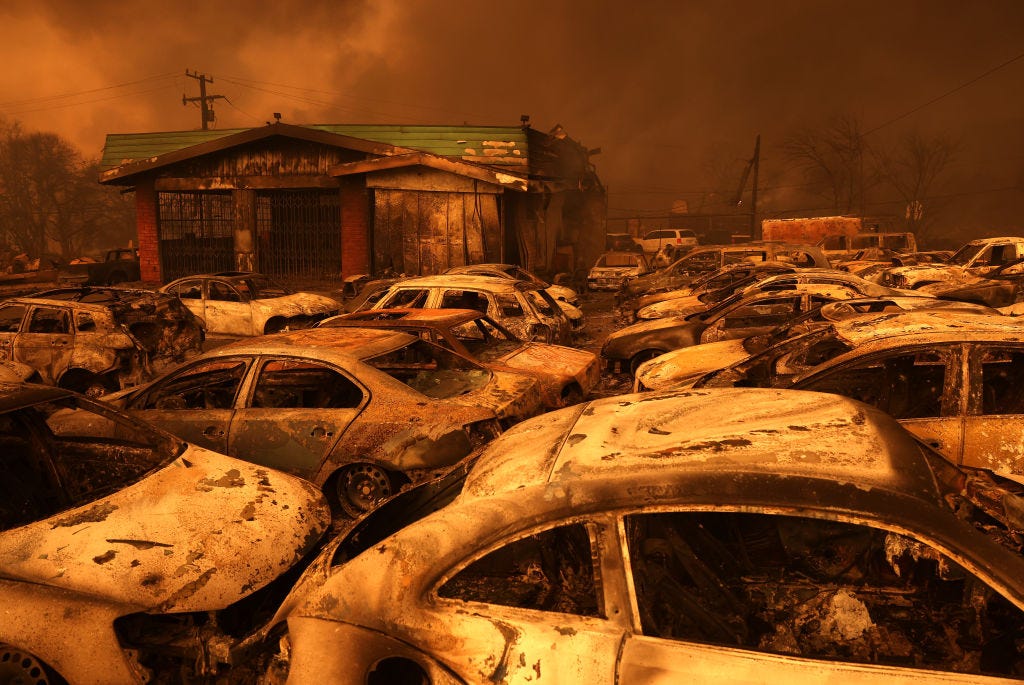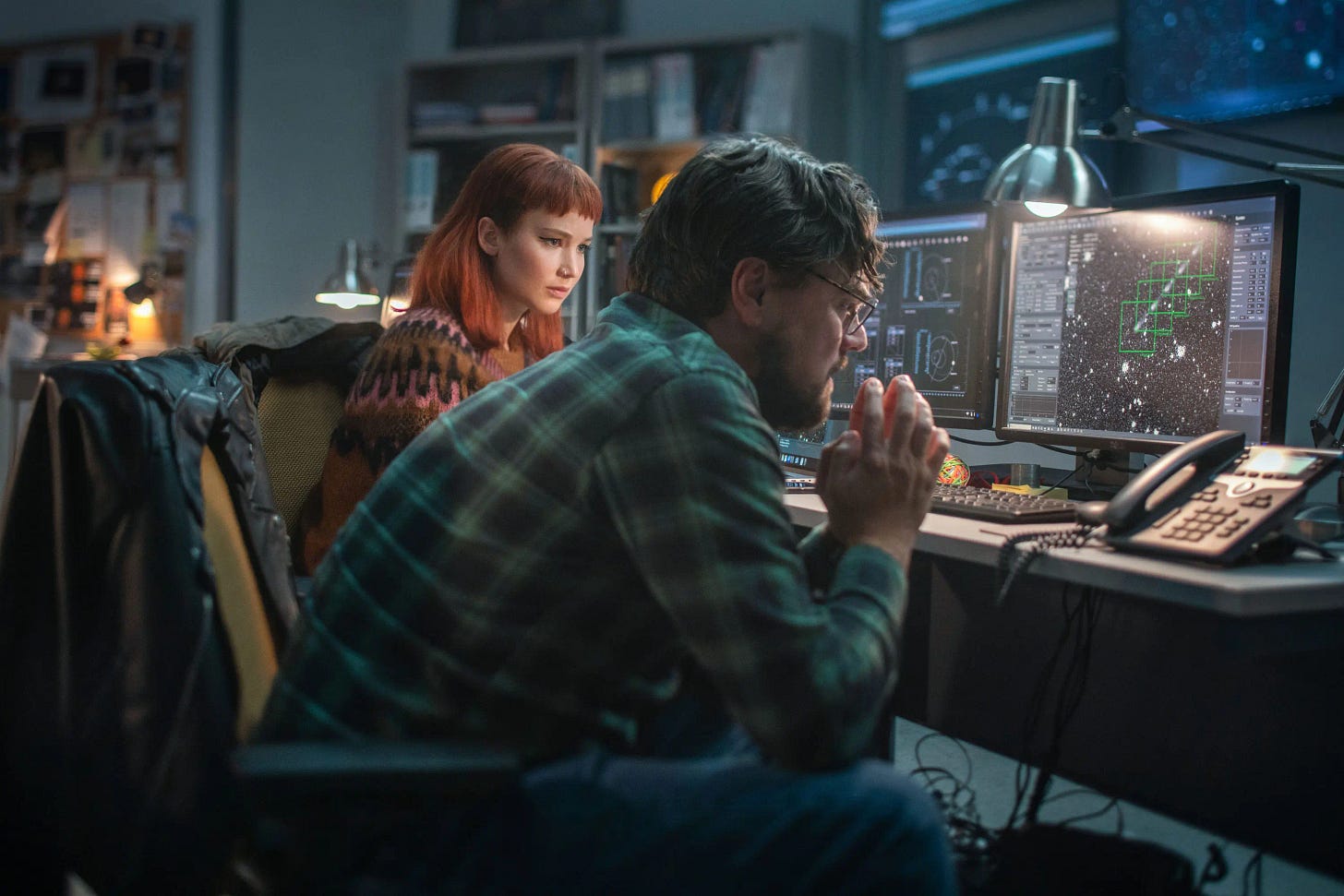We Can Choose the Ending to This Disaster Movie
The Los Angeles fires are either a wake-up call or a funeral pyre. It’s our decision.
David Sirota is founder and editor-in-chief of The Lever, an investigative newsroom, and he co-wrote the story of Netflix’s ‘Don’t Look Up” with Adam McKay. If you like this article, sign up for The Lever's free newsletter.

In the quest to find an apt metaphor for these dark days, the ongoing destruction of Southern California offers a horrifying smorgasbord. There is an oil baron’s museum surrounded by fire. There is a McDonald’s about to go up in flames. There is a baby deer scampering across a smoky street. There is the weirdly calm living room scene being engulfed by flames, while the family dog panics.
The metaphor haunting my mind is a juxtaposition of personal memories. In 2022, I traveled west for what felt to me like a safari in a foreign land, a brief but whirlwind tour of the weird, exotic, funky, and altogether wonderful phantasmagoria of Los Angeles, California. I was there for the release of ‘Don’t Look Up,’ hoping the film that I contributed to would meaningfully boost the global effort to prompt climate action. And now, I see many of the places I visited during that trip threatened by the blaze, currently burning, or already destroyed in fiery scenes that seem straight out of an apocalypse tale.
Only three years later, the images emerging from the Los Angeles cataclysm – which is indeed fueled by global heating – make the movie seem like an understatement.
Whether you loved or hated it – whether you think it was hilarious, unfunny, successful, or a bomb – ‘Don’t Look Up’ was one of many attempts to spotlight the climate crisis and lament our culture’s inability to focus on, process, and constructively react to inconvenient facts threatening our survival.
As Los Angeles smolders, the questions remain the same after every climate-intensified flood, tornado, wildfire, and mudslide. They are the same questions the film tried to amplify – questions that so many scientists, advocates, and concerned citizens have been asking for decades: What will it take for us to be shaken into action? And what does urgent action actually look like?
Right now, the phrase “shaken into action” is appropriate because we still seem to be in a comatose state when it comes to climate. Despite 2024’s multibillion-dollar climate disasters that wreaked havoc throughout the country, climate change ranked near the bottom in a Gallup poll of Americans’ top concerns. This lack of political salience reflects both the understandable supremacy of short-term economic survival issues (health care, inflation, etc.) but also the media depiction – or lack thereof – of the climate emergency.
Day to day, climate is simply not part of the news and political discussion in the US, and it is particularly absent in smaller, so-called heartland outlets, according to recent data. In many cases – including during the Los Angeles fire – fossil-fueled global heating goes unmentioned in the news coverage of the causes of climate-related disasters.
When climate change is covered, it is often siloed as its own separate niche “green” issue from a news outlet’s “climate desk” – rather than baked into coverage of the day’s news as context for why myriad events are unfolding.
Even the really huge milestones – like the Earth breaking through the 1.5-degree temperature limit for habitability – are treated as momentary bits of news, no bigger than the latest celebrity feud. And voices in media and politics trying to spotlight the climate problem are often scoffed at, eyerolled, and depicted as nihilistic “doomers,” deranged alarmists, or unserious gadflies.
The same dynamic holds for popular culture. Not only is there a lack of climate-specific films and TV shows, but the backdrops of most of the Hollywood-created worlds on our screens lack any evidence of the climate crisis. In a study of the 250 top-grossing films between 2013 and 2022, climate change existed in less than 13% of the story worlds, and less than 10% included a character who knew climate change existed. To watch most sitcoms or films today is to behold a more stable climate that no longer exists here in the real world.
Grand Act of Deception
Meanwhile, the fossil fuel industry and the conservative movement are trying to suppress information that might prompt more climate awareness.
On Capitol Hill, Republicans are aiming to block a new rule requiring companies to better disclose their greenhouse gas emissions.
In California, corporate groups are trying to convince a Republican-stacked federal court to block the state’s new laws requiring companies to publicly disclose how much they are contributing to the climate emergency fueling the Los Angeles inferno and what climate-related threats these companies face in their businesses.
Taken together, this is a campaign to pretend the climate crisis isn’t happening, a grand act of deception and delusion that pads the profits of the fossil fuel industry that sponsors America’s politicians and its media.
In Montana and Florida, Republican governors have tried to prevent state agencies from considering or mentioning climate change.
In Iowa, a local TV meteorologist faced professional reprisals – and threats of violence – for daring to mention climate change in weather reports.
And on the internet, conservatives are already hard at work trying to pull the Los Angeles fire discourse away from any focus on climate.

Taken together, this is a campaign to pretend the climate crisis isn’t happening, a grand act of deception and delusion that pads the profits of the fossil fuel industry that sponsors America’s politicians and its media. Worse, this campaign delays urgently needed actions to protect our country from the heating we’ve already baked into the climate – and to stave off even more of such heating that will make things exponentially worse.
Such actions aren’t mysterious or impossible. They are obvious and achievable.
D-Day Style Mobilization
We need to stop denying and start acknowledging the real fire, flood, and hurricane risks we face and then adjust accordingly. That means a D-Day style mass mobilization, implementing everything from rational zoning to better building codes to smarter forest management to new investments in hardening homes, businesses, and communities. All of these efforts are absolutely possible and would create jobs to boot.
We concurrently need to get off fossil fuels as quickly as possible – again, this is eminently doable, especially in an era in which clean energy is now cost-competitive.

So what’s stopping us? Among even those who accept that climate change is happening, there remains a pervasive feeling of inevitable doom, a sense that our society simply cannot do anything about this.
Such feelings of despondence are entirely understandable – even rational – not merely because the climate crisis feels so enormous and diffuse, but also because it is increasingly difficult to remember moments when our government and society actually achieved big things. The New Deal, civil rights laws, and the creation of Medicare have become forgotten history. Successes in healing the ozone layer and combating the HIV crisis are distant memories. Meanwhile, other allegedly landmark achievements like the Affordable Care Act have epically failed to solve the crises they targeted.
When it comes to climate action, the lack of big achievements has been particularly demoralizing.
A crisis that was recognized all the way back in the 1960s and looked like it might be taken seriously by Jimmy Carter’s administration was soon ignored and then scoffed at. That included George W. Bush dropping a pledge to regulate carbon dioxide and pulling out of the Kyoto Treaty, Barack Obama promoting fossil fuel development and proudly demanding credit for an oil boom, Donald Trump insisting the climate crisis is a “hoax,” and Joe Biden adopting a sit-tight-and-assess attitude in refusing to declare a climate emergency even amid the intensifying cataclysm.
It’s enough to prompt a primal scream of rage, followed by a despondent trip to the grocery store to purchase a final serving of fingerling potatoes.
In the disaster movie we’re living through, we actually have the knowledge and the wealth to do what needs to be done.
And yet, this is not the end scene of ‘Don’t Look Up.’ We’re not at the final dinner table just yet.
We still have time to get this right, and the good news is: the big challenges aren’t technology or resources. In the disaster movie we’re living through, we actually have the knowledge and the wealth to do what needs to be done.
Our problem is psychology and politics – difficult obstacles, yes, but within our own collective control. Unlike generations of humans that preceded us, we have the power to pick our own destiny in this existential crisis.
Whether or not we use that power will determine if the Los Angeles fires are a wake-up call or a funeral pyre.
The views expressed in this article are the author’s own and do not necessarily reflect those of Zeteo.
Check out more from Zeteo:







While at it, can we also suggest we stop burning other countries to the ground and destroying innocent lives?. Climate change is a reality that needs to be addressed but it’s unavoidable at this point to think of the wrath of God on a country that has been going around destroying lives all around the globe.
In addition to measures countering climate changes, how about repentance and pledging to right the wrongs in Iraq, Afghanistan, Palestine and even go back further to Vietnam.
Dare we suggest that we stop spending on arming the ongoing genocide and instead use the money to help the victims build back their lives.
Is it simply because the climate cost is usually born by government coffers, never from the wallets of those responsible? The crazy figures attached to these disasters are not a price tag any billionaire, war hawk, or corporate parasite has had to worry about to date. We need more than money as a measure.